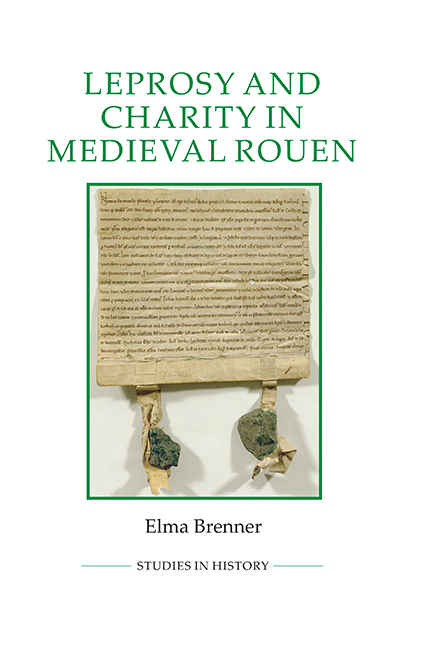Book contents
- Frontmatter
- Dedication
- Contents
- List of Illustrations
- Acknowledgements
- Abbreviations
- Introduction: Leprosy, Charity and Rouen
- 1 Rouen’s Principal Leper House: Mont-aux-Malades and Its Endowment
- 2 Charity and Community at Mont-aux-Malades
- 3 Rouen’s Other Leper Houses: Institutions, Gender and Status
- 4 Leprosy and the Medical World of Rouen
- 5 Leprosy and the Religious Culture of Rouen
- Conclusion
- Appendix 1 A Note on Sources
- Appendix 2 Charters and other Documents Relating to Leprosy in Rouen, c. 1100–c. 1500
- Bibliography
- Index
3 - Rouen’s Other Leper Houses: Institutions, Gender and Status
Published online by Cambridge University Press: 07 May 2022
- Frontmatter
- Dedication
- Contents
- List of Illustrations
- Acknowledgements
- Abbreviations
- Introduction: Leprosy, Charity and Rouen
- 1 Rouen’s Principal Leper House: Mont-aux-Malades and Its Endowment
- 2 Charity and Community at Mont-aux-Malades
- 3 Rouen’s Other Leper Houses: Institutions, Gender and Status
- 4 Leprosy and the Medical World of Rouen
- 5 Leprosy and the Religious Culture of Rouen
- Conclusion
- Appendix 1 A Note on Sources
- Appendix 2 Charters and other Documents Relating to Leprosy in Rouen, c. 1100–c. 1500
- Bibliography
- Index
Summary
There were several leprosaria around Rouen in addition to Mont-aux- Malades, as befitted a city of Rouen's size and importance. Most of these houses were small, modest foundations. Although each leper house served a distinct local community, these institutions were also interconnected, through relationships with each other and with Mont-aux-Malades. These connections suggest that provision for lepers was to some extent coordinated, not necessarily through ecclesiastical or municipal oversight, but rather through the related activities of different leper houses. The female house of Salle-aux-Puelles stands out as an institution of comparable status to Mont-aux-Malades; other leprosaria were considerably less wealthy and sometimes ephemeral, and have left a much fainter trace in the documentary and material record. As was the case elsewhere, in Rouen the leprosarium was clearly a flexible type of institution, with a variety of functions, which ranged from the facilities for diagnosis, bodily care and spiritual services at Mont-aux-Malades, to the much more basic hospitality provided by the leper houses at Darnétal, Bois-Guillaume and other villages. The diverse services offered by the leprosaria reflect how responses to leprosy varied and changed over time, and also highlight the multiple social statuses of sufferers.
A leper house for women
The character of Salle-aux-Puelles permits an exploration of female religiosity and piety in the context of leprosy, building upon the wealth of literature on medieval religious women that has been published over the last twenty-five years. Focusing on the special medical, spiritual and moral issues associated with the care of leprous women, this section describes the foundation and endowment of Salle-aux-Puelles, the resident community and discipline, the physical resources and infrastructure of the leprosarium, and how the leprous women were cared for. It also examines the important changes that the institution underwent in the course of the fourteenth century, which place Salle-aux-Puelles in the broader context of the history of Rouen. It draws upon a much smaller body of source material than exists for Mont-aux-Malades, since only a handful of documents survive for Salleaux- Puelles, mostly conserved in the archive of the Hôtel-Dieu (formerly La Madeleine).
Like Mont-aux-Malades, Salle-aux-Puelles, at Petit-Quevilly south-west of Rouen, enjoyed royal and archiepiscopal patronage, particularly that of Henry II, who made a key donation to the community in the 1180s.
- Type
- Chapter
- Information
- Leprosy and Charity in Medieval Rouen , pp. 58 - 82Publisher: Boydell & BrewerPrint publication year: 2015



